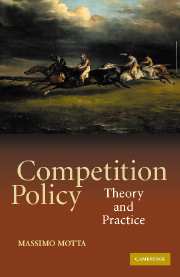Book contents
- Frontmatter
- Dedication
- Contents
- List of Figures
- List of Tables
- Preface
- Acknowledgements
- List of Abbreviations
- 1 Competition Policy: History, Objectives, and the Law
- 2 Market Power and Welfare: Introduction
- 3 Market Definition and the Assessment of Market Power
- 4 Collusion and Horizontal Agreements
- 5 Horizontal Mergers
- 6 Vertical Restraints and Vertical Mergers
- 7 Predation, Monopolisation, and Other Abusive Practices
- 8 A Toolkit: Game Theory and Imperfect Competition Models
- Bibliography
- References to Cases and Legislation
- Index
1 - Competition Policy: History, Objectives, and the Law
Published online by Cambridge University Press: 05 August 2015
- Frontmatter
- Dedication
- Contents
- List of Figures
- List of Tables
- Preface
- Acknowledgements
- List of Abbreviations
- 1 Competition Policy: History, Objectives, and the Law
- 2 Market Power and Welfare: Introduction
- 3 Market Definition and the Assessment of Market Power
- 4 Collusion and Horizontal Agreements
- 5 Horizontal Mergers
- 6 Vertical Restraints and Vertical Mergers
- 7 Predation, Monopolisation, and Other Abusive Practices
- 8 A Toolkit: Game Theory and Imperfect Competition Models
- Bibliography
- References to Cases and Legislation
- Index
Summary
INTRODUCTION
Rather than starting with a long and abstract discussion of what competition policy is, this chapter aims at introducing the reader to competition issues by using a historical approach. Section 1.2 briefly describes the main features that competition policies have exhibited in the past in the US and in Europe. The historical review also shows that in the practice of competition policy a number of public policy considerations and objectives have been (and still are) used. Section 1.3 briefly discusses them, and indicates the possible conflicts between economic and noneconomic objectives. Armed with this discussion, at the end of the Section I also provide the definition of competition policy that I use in the book. Section 1.4 describes the main features of competition law in the European Union (EU), to provide the reader with further insight of what competition policy is about.
BRIEF HISTORY OF COMPETITION POLICY
This section briefly reviews the main historical events in the development of competition (or anti-trust) laws in the US and in the European Union. The purpose here is not to have a complete description of the history of competition laws, but rather to help understand the circumstances in which competition laws were created and enforced, as well as the objectives which they purported to attain.
1.2.1 Anti-Trust Law in the United States
The origins of modern competition policy can be traced back to the end of the 19th century, mainly as a reaction to the formation of trusts in the United States.
The Events Leading to the Sherman Act In the second half of that century, the United States experienced a number of events, which resulted in the transformation of manufacturing industries. Perhaps the most important events were the dramatic improvement in transportation and communication. The railways extended rapidly throughout the US territory, as did the telegraph lines and the telephone services.
- Type
- Chapter
- Information
- Competition PolicyTheory and Practice, pp. 1 - 38Publisher: Cambridge University PressPrint publication year: 2004



